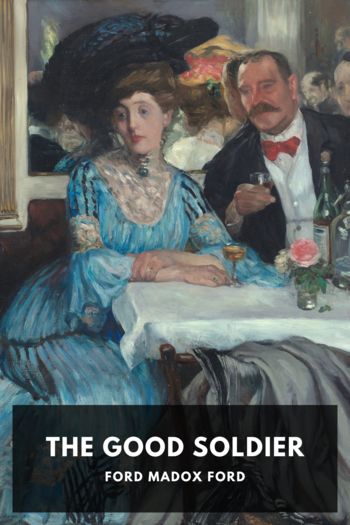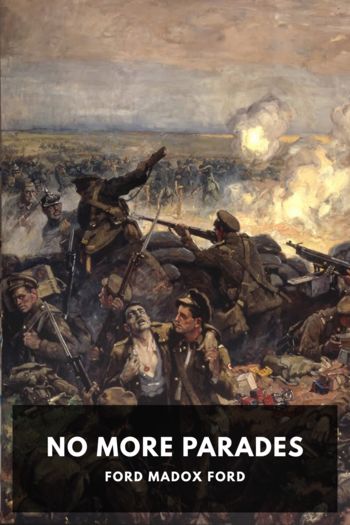The Good Soldier by Ford Madox Ford (top 10 ebook reader TXT) 📕

- Author: Ford Madox Ford
Book online «The Good Soldier by Ford Madox Ford (top 10 ebook reader TXT) 📕». Author Ford Madox Ford
The Eau de Mélisse had calmed Edward to such an extent that, for the moment, he really had a head on his shoulders. He did nothing more than grunt:
“And then?”
“Why,” she answered, “I may just as well have the ten thousand dollars as the tables. I will go with you to Antibes for a week for that sum.”
Edward grunted: “Five.” She tried to get seven thousand five hundred; but he stuck to his five thousand and the hotel expenses at Antibes. The sedative carried him just as far as that and then he collapsed again. He had to leave for Antibes at three; he could not do without it. He left a note for Leonora saying that he had gone off for a week with the Clinton Morleys, yachting.
He did not enjoy himself very much at Antibes. La Dolciquita could talk of nothing with any enthusiasm except money, and she tired him unceasingly, during every waking hour, for presents of the most expensive description. And, at the end of a week, she just quietly kicked him out. He hung about in Antibes for three days. He was cured of the idea that he had any duties towards La Dolciquita—feudal or otherwise. But his sentimentalism required of him an attitude of Byronic gloom—as if his court had gone into half-mourning. Then his appetite suddenly returned, and he remembered Leonora. He found at his hotel at Monte Carlo a telegram from Leonora, dispatched from London, saying; “Please return as soon as convenient.” He could not understand why Leonora should have abandoned him so precipitately when she only thought that he had gone yachting with the Clinton Morleys. Then he discovered that she had left the hotel before he had written the note. He had a pretty rocky journey back to town; he was frightened out of his life—and Leonora had never seemed so desirable to him.
VI call this the Saddest Story, rather than “The Ashburnham Tragedy,” just because it is so sad, just because there was no current to draw things along to a swift and inevitable end. There is about it none of the elevation that accompanies tragedy; there is about it no nemesis, no destiny. Here were two noble people—for I am convinced that both Edward and Leonora had noble natures—here, then, were two noble natures, drifting down life, like fireships afloat on a lagoon and causing miseries, heartaches, agony of the mind and death. And they themselves steadily deteriorated. And why? For what purpose? To point what lesson? It is all a darkness.
There is not even any villain in the story—for even Major Basil, the husband of the lady who next, and really, comforted the unfortunate Edward—even Major Basil was not a villain in this piece. He was a slack, loose, shiftless sort of fellow—but he did not do anything to Edward. Whilst they were in the same station in Burma he borrowed a good deal of money—though, really, since Major Basil had no particular vices, it was difficult to know why he wanted it. He collected—different types of horses’ bits from the earliest times to the present day—but, since he did not prosecute even this occupation with any vigour, he cannot have needed much money for the acquirement, say, of the bit of Genghis Khan’s charger—if Genghis Khan had a charger. And when I say that he borrowed a good deal of money from Edward I do not mean to say that he had more than a thousand pounds from him during the five years that the connection lasted. Edward, of course, did not have a great deal of money; Leonora was seeing to that. Still, he may have had five hundred pounds a year English, for his menus plaisirs—for his regimental subscriptions and for keeping his men smart. Leonora hated that; she would have preferred to buy dresses for herself or to have devoted the money to paying off a mortgage. Still, with her sense of justice, she saw that, since she was managing a property bringing in three thousand a year with a view to reestablishing it as a property of five thousand a year and since the property really, if not legally, belonged to Edward, it was reasonable and just that Edward should get a slice of his own. Of course she had the devil of a job.
I don’t know that I have got the financial details exactly right. I am a pretty good head at figures, but my mind, still, sometimes mixes up pounds with dollars and I get a figure wrong. Anyhow, the proposition was something like this: Properly worked and without rebates to the tenants and keeping up schools and things, the Branshaw estate should have brought in about five thousand a year when Edward had it. It brought in actually about four. (I am talking in pounds, not dollars.) Edward’s excesses with the Spanish Lady had reduced its value to about three—as the maximum figure, without reductions. Leonora wanted to get it back to five.
She was, of course, very young to be faced with such a proposition—twenty-four is not a very advanced age. So she did things with a youthful vigour that she would, very likely, have made more merciful, if she had known more about life. She got Edward remarkably on the hop. He had to face her in a London hotel, when he crept back from Monte Carlo with his poor tail between his poor legs. As far as I can make out she cut short his first mumblings and his first attempts at affectionate speech with words something like:
“We’re on the verge of ruin. Do you intend to let me pull things together? If not I shall retire to Hendon on my jointure.” (Hendon represented a convent to which she occasionally went for what is called a “retreat” in Catholic circles.)
And poor dear





Comments (0)